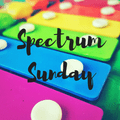
I feel that I owe you an explanation as to why I’ve chosen the name “Sensational Learning”. Although I’m hoping that the learning experiences I try to create for Penguin will indeed sometimes be sensational, in the usual meaning of the word, I wouldn’t have chosen the name on that basis alone. Instead, it comes from playing around with words like sensory, making sense, and SEN (Special Education Needs), which are all highly relevant terms for our journey in learning.
If you look up the etymology of the word “sensational”, you’ll find (not so surprisingly) that it was originally used to describe something that stimulates the senses, causing a physical sensation. And when it comes to ASD, the senses and the way they respond to being stimulated, is central. Many of the symptoms that form basis for a diagnosis of autism are the results of a nervous system which processes sensory input in ways that are different to the norm. A person with autism may react strongly to certain sounds, due to them being seriously painful to them, or they may feel the need to spin, jump or rock in order to provide a calming input when experiencing sensory overload. One person with autism might have a nervous system that’s craving certain stimuli, such as squeezing, chewing, flickering, sharp sounds or strong flavours, while another person (or even the same person on another day!) feels the need to avoid those very same things, as they’re causing unbearable discomfort.
While sensory stimulation can be a source of great distress to a person with ASD, it can also be key in their learning and development. There are quite a few therapies which are based around sensory stimulation, and the aim of these are usually to “strengthen the pathways”, building stronger connections in the brain and other parts of the nervous system. This will then, hopefully, make it easier for the person to deal with sensory input in general, and make them more resistant to sensory overload.
One of the ways of working with this is through “environmental enrichment”, where the person is exposed daily to intensive experiences of smells, touch, music etc. In future posts I’ll get back to how we incorporate aspects of this into our life with Penguin, but for now I recommend you to have a look at this article, which is from one of the leading studies on the subject, so far.
To better understand how sensory processing difficulties can affect a person’s experience of everyday life, and how this can lead to sensory overload and meltdowns or shutdowns, please watch these videos from The National Autistic Society: Can you make it to the end? and Make it stop. Make sure to keep the volume turned up.
Bear in mind that there can be great variations in how different individuals on the autism spectrum percieve things. So although videos like these are brilliant for giving us an idea of what it can be like to have autism, not everyone on the spectrum will find these representations accurate to their experience of sensory overload.
Finally, this post from Bill Nason/Autism Discussion Page is, from my perspective, one of the greatest things ever posted on facebook (and therefor also the first post I shared on our facebook page): Autism is not about behaviour
Thank you for taking your time to read this post, which will serve as a background to much of what we do. As you’ll see in future posts, too, sensory processing and stimulation plays a crucial part in my educational philosophy for Penguin. And that’s why we’re “sensational” 🙂



Really interesting – pinning to my SEND and education board. Thanks for linking it to #spectrumsunday
LikeLiked by 1 person
Thank you! 🙂
LikeLike
I love the name, and I think it sums up everything beautifully. Thanks so much for linking up at #KCACOLS. Hope you come back again next time.
LikeLiked by 1 person
Oh, that’s so kind of you, thank you so much! 💕
LikeLike
I’m a complete novice to the world of autism and your explanation of it all makes so much sense. I’m looking forward to reading more about Penguin and your world. #kcacols
LikeLiked by 1 person
Again, thank you so much, it warms my heart hearing this ♥️
LikeLike